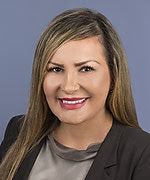Developmental and Behavioral Pediatrics Team
-
DIVISION CHIEF
Roger Scott Akins, D.O.
Link to Roger Scott Akins bioarrow_forwardRoger Scott Akins is a developmental and behavioral pediatrician specializing in the care of children with neurodevelopmental disorders. He has special clinical interest and expertise in Autism Spectrum Disorders, Intellectual Disability and Trisomy 21.

Veronica Ahumada-Newhart, M.A., Ph.D.
Assistant Professor

Roger “Scott” Akins, D.O. (Division Chief)
Division Chief
Clinical Professor

Kathleen Angkustsiri, M.D., M.A.S.
Program Director, Developmental-Behavioral Pediatrics Fellowship
Associate Professor
Jonathan Bernard Bystrynski, Ph.D.
Psychologist

Janice Enriquez, Ph.D.
Clinical Professor
Behavioral Health Psychiatric Supervisor II
Psychologist

Randi Jenssen Hagerman, M.D., F.A.A.P.
Distinguished Professor, Department of Pediatrics
Endowed Chair in Fragile X Research
Medical Director of the MIND

Robin L. Hansen, M.D.
Professor Emerita, Division of Clinical Pediatrics

Van Ma, M.D.
Assistant Professor
Gayatri Mahajan, M.B.B.S., M.D.
Associate Physician Diplomat

Bibiana Restrepo, M.D.
Associate Professor

Rosa Denisse Rodriguez, M.D.
Medical Director, Baby Steps HRIF Clinic
Assistant Professor

Andrea Schneider, Ph.D.
Associate Research Scientist
Psychologist

Carrie Esther Silver, Ph.D.
Associate Clinical Professor

Anisha P. Srinivasan, M.D., M.S.
Assistant Professor

Tanaporn Jasmine Wilaisakditipakorn, M.D.
Assistant Professor
Contact Information
For academic or faculty-related questions, e.g., information about the developmental and behavioral pediatric fellowship, other training programs or our research activities, please call our academic office phone number.
For referring physicians, please call our patient referrals phone number for assistance with developmental behavioral services.
Developmental and Behavioral Pediatrics
TICON II - 2516 Stockton Blvd.
Sacramento, CA

